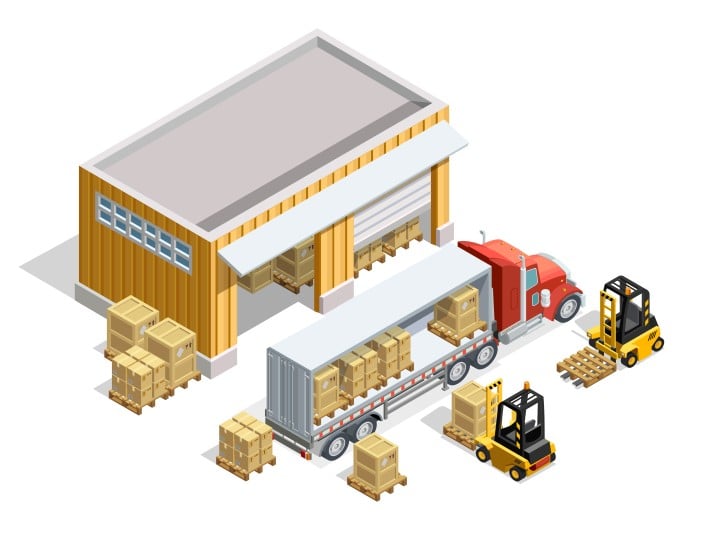
In today’s rapidly evolving world of logistics and transportation, businesses are continually seeking innovative strategies to enhance their profit margins and operational efficiency. One such strategic gem that has emerged as a cornerstone in achieving these objectives is truckload freight shipping. This comprehensive guide is dedicated to delving deep into the intricacies of truckload freight shipping, where we will explore its precise definition, delve into its myriad benefits, carefully weigh the considerations when selecting the right carrier, and articulate how astute businesses can leverage this potent tool to optimize their bottom line.
Understanding Truckload Freight Shipping
What Constitutes Truckload Freight Shipping?
Truckload Freight Shipping, an abbreviation often used to denote it as TL shipping, is a highly specialized mode of transportation that distinguishes itself by the fact that a single shipment comprehensively occupies an entire truck trailer. In essence, within this paradigm, the cargo encapsulated within the trailer is exclusively affiliated with one solitary customer, and the journey from the initial point of origin to its ultimate destination is direct and unswerving, with nary an interim stop for the aggregation of supplementary loads.
A Comparison with Less-Than-Truckload (LTL) Shipping
In marked contrast to the TL shipping model, Less-Than-Truckload (LTL) Shipping bears the hallmark of consolidating multiple, smaller shipments derived from diverse customers into one collective trailer. TL shipping, without question, proves to be the choicest option for those businesses that grapple with the mammoth task of managing substantial volumes of goods.
The Multifaceted Benefits of Truckload Freight Shipping
Cost Efficiency: The Undisputed Champion
Cost efficiency stands out as one of the preeminent and undeniable advantages that TL shipping offers. With TL shipping, the financial outlay is tethered to the entirety of the trailer rather than the volume occupied by the shipment. This invariably results in a considerably lower cost per unit when compared to its counterpart, Less-Than-Truckload (LTL) Shipping, a factor that makes it exceedingly alluring to businesses seeking to maximize their fiscal prudence.
Swift Transit Times: Racing Against the Clock
The unobstructed and uninterrupted journey from the origin to the ultimate destination renders TL shipments inherently more advantageous in terms of transit times. In stark contrast, the meandering nature of LTL shipping, punctuated by multiple stops for the amalgamation of diverse shipments, inevitably introduces conspicuous delays, making TL shipping the unequivocal choice for businesses that demand time-sensitive deliveries.
Reduced Vulnerability to Damage: A Shield of Protection
The marked reduction in the number of handling points is an intrinsic feature of TL shipping, which, in turn, engenders a significantly lower risk of cargo damage during transit. This reduction in risk assumes paramount importance, particularly for businesses that deal in the transportation of fragile or high-value goods, where even the slightest mishandling can yield catastrophic consequences.
Accommodating Bulk Shipments: The Need for Space
For businesses confronted with the formidable task of transporting voluminous quantities of goods, TL shipping unfailingly offers the expansive capacity and spatial requisites essential for the efficacious conveyance of these substantial shipments, thereby ensuring that the cargo remains intact, secure, and undisturbed throughout the duration of the journey.
Enhanced Tracking and Visibility: A Modern Panacea
The contemporary era of technology has ushered in a new era of superior tracking and visibility within the realm of TL shipping. This technological progression endows businesses with the invaluable ability to monitor their shipments in real-time, thus providing them with unprecedented levels of control and the wherewithal to make informed decisions in the midst of the intricate web of transportation.
The Delicate Art of Selecting the Right Truckload Freight Carrier
The Crucial Assessment of Carrier Reputation
In the realm of TL shipping, the selection of the right carrier emerges as a pivotal and non-negotiable consideration. In this regard, businesses must diligently engage in the meticulous and comprehensive assessment of carrier reputation. This imperative endeavor necessitates the meticulous scrutiny of a carrier’s historical track record, the perusal of customer reviews, and the judicious gathering of feedback, all of which collectively serve as the litmus test for reliability and performance.
The Embrace of Modern Equipment and Technology
When confronted with the crucial choice among an array of prospective carriers, it becomes imperative to contemplate their commitment to and investment in cutting-edge equipment and technology. Carriers that are in possession of and actively engage with contemporary equipment are more likely to offer superior service and engender greater operational efficiency, two facets that can invariably translate into substantive financial benefits for the businesses that they serve.
The Thorough Scrutiny of Pricing Structures and Contracts
The intricate interplay of pricing structures and contractual obligations constitutes a domain replete with potential pitfalls and intricacies that require a detailed and nuanced evaluation. To ensure the avoidance of any unforeseen and unpleasant financial surprises, businesses must meticulously and judiciously analyze the contours of pricing structures and contractual terms offered by prospective carriers. Clarity in this sphere is of paramount importance and can serve as a bulwark against the vagaries of financial turbulence.
Unleashing the Full Potential of Truckload Freight Shipping
The Strategic Imperative of Load Planning Optimization
The art of optimizing load planning assumes a central and strategic role in the tapestry of efficient TL shipping. It entails the meticulous orchestration of shipments in a manner that maximizes the utilization of available trailer space, effectively eradicating any vestiges of wasted capacity that might conceivably precipitate unnecessary financial hemorrhaging.
Harnessing the Power of Technology for Operational Efficacy
In the digitally-driven epoch that we inhabit, technology indisputably reigns supreme in the realm of logistics. As such, the leveraging of technology, through the deployment of Transportation Management Systems (TMS) and route optimization software, emerges as a transformative instrument for streamlining TL shipping operations. The dividends of this approach are manifestly evident in the form of enhanced efficiency and reduced operational costs.
The Indispensable Role of Effective Communication
Effective communication stands as the linchpin that holds together the intricate edifice of successful TL shipping. Businesses must conscientiously erect a network of seamless channels of communication, one that facilitates the unfettered flow of information between carriers, drivers, and customers. This ensures that shipments traverse the complex terrain of transportation without the slightest friction, thereby guaranteeing their safe and efficient passage from origin to final destination.
The Challenges and Nuances of Truckload Freight Shipping
Capacity Shortages: Navigating Troubled Waters
In the labyrinthine realm of TL shipping, one perennial challenge looms large – capacity shortages. These shortages present a thorny and intricate dilemma that requires innovative and agile strategies to address. In the following sections, we will explore these strategies, delving into how businesses can navigate these troubled waters to ensure that their supply chains remain robust and adaptable in the face of adversity.
Environmental Concerns: A Conscientious Stance
The environmental dimension casts a long and looming shadow over the TL shipping landscape. As such, it is imperative to explore the intricate web of environmental concerns that are intrinsically tied to this industry. However, the discourse does not end with the acknowledgment of these concerns; it extends to the proactive measures and initiatives that the industry is undertaking to reduce its carbon footprint and usher in a more sustainable era of transportation.
Regulatory Compliance: Navigating the Regulatory Maze
In the dynamic world of TL shipping, regulatory compliance emerges as a critical factor. The ever-evolving landscape of regulations, policies, and standards demands unwavering attention and vigilance. Staying informed and abreast of these regulations is not merely a matter of compliance; it is a strategic imperative that safeguards against potential legal and operational pitfalls.
In summation, truckload freight shipping is not merely a logistics strategy; it is a potent instrument that empowers businesses to achieve remarkable cost savings, heightened efficiency, and an unprecedented degree of control over their supply chain. By meticulously selecting the right carrier, optimizing their operations, and remaining attuned to the dynamic tides of industry trends, businesses can unleash the full potential of TL shipping to maximize their profit margins and operational efficiency. For those seeking a trusted partner in this endeavor, DLX Freight stands as a beacon of reliability and expertise, ready to facilitate your journey towards enhanced profitability and operational excellence.
We hope you found this blog post on Maximizing Profit and Efficiency: Exploring the Key Benefits of Truckload Freight Shipping, useful. Be sure to check out our post on The Role of Truck Transportation in Logistics for more great tips!
Have Experience in the Moving Industry? Want an Additional Income Stream? Work With All Around Moving!
Our unique Work With Us program gives the opportunity to experienced moving consultants to run their own Moving Consultant business from anywhere in the United States. Click here to learn more.





